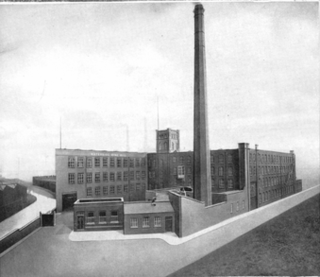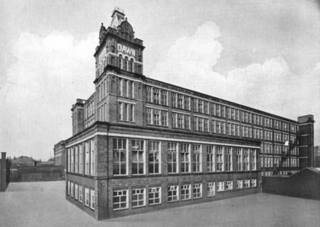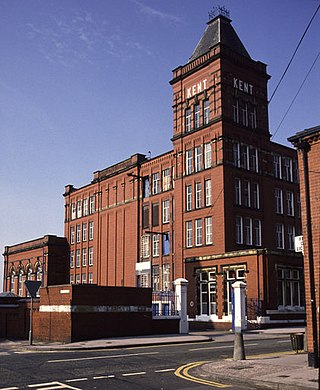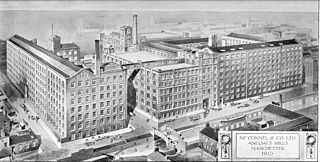Sir Philip Sidney Stott, 1st Baronet, usually known by his full name or as Sidney Stott, was an English architect, civil engineer and surveyor.

Tudor Mill was cotton spinning mill in Ashton-under-Lyne, in the historic county of Lancashire, England. It was built between 1901 and 1903 for the Ashton Syndicate by Sydney Stott of Oldham. Tudor Mill was next to the Ashton Canal Warehouse at Portland Basin. It ceased spinning cotton in the 1960s and was used as a warehouse until it was destroyed by fire in 1970

Minerva Mill was a cotton spinning mill in Ashton-under-Lyne, Greater Manchester, England. It was built between 1891 and 1892 for the Minerva Spinning Company which was later known as the Ashton Syndicate. Minerva Mill was next to the later Texas mill, at Whitelands. It ceased spinning cotton in the 1920s and was demolished in 1937.

Rock Mill was cotton spinning mill in the Waterloo district of Ashton-under-Lyne, Greater Manchester, in England. It was built between 1891 and 1893 for the Ashton Syndicate by Sydney Stott of Oldham. Rock Mill was built on the site of Wilshaw Mill retaining and using the octagonal chimney. It ceased spinning cotton in the 1960s and was demolished in 1971; the site became the location for the town's first Asda supermarket, which opened in 1972, until Asda relocated to a much larger new store site in Cavendish Street in 1989.

Atlas Mill was a cotton spinning mill in the Waterloo district of Ashton-under-Lyne, Greater Manchester, in England. It was built between 1898 and 1900 for the Ashton Syndicate by Sydney Stott of Oldham. It was last mill in Ashton to cease spinning. It was spinning artificial fibres in 1987, it closed in 1990 and was demolished in 1994; the site is now a housing estate.

Texas Mill was a cotton spinning mill in the Whitelands district of Ashton-under-Lyne, Greater Manchester, in England. It was built between 1905 and 1907 for the Ashton Syndicate by Sydney Stott of Oldham. It was destroyed in a massive fire on 22–23 October 1971. It had been re-equipped as a ring mill for spinning artificial fibres when it was destroyed.

Cedar Mill was a cotton spinning mill in the Hurst area of Ashton-under-Lyne, Greater Manchester, in England. It was built between 1903 and 1905 for the Ashton Syndicate by Sydney Stott of Oldham. It was the last mill in Ashton spinning cotton. It ceased in 1980. It was demolished and the land was used for housing.

Cavendish Mill is a Grade II* listed former cotton spinning mill in Ashton-under-Lyne, Greater Manchester, in the United Kingdom. It was built between 1884 and 1885 for the Cavendish Spinning Company by Potts, Pickup & Dixon of Oldham. Cavendish Mill was next to the Ashton Canal Warehouse at Portland Basin. It ceased spinning cotton in 1934 and was then used for a variety of purposes before it was converted into housing in 1994.

Trent Mill was a cotton spinning mill on Duchess Street in Shaw and Crompton, Greater Manchester, England. It was built by F.W. Dixon & Son in 1908. It closed and was taken over by the Lancashire Cotton Corporation in 1929 reopened in 1938 and closed again in 1962, and was demolished in 1967.

Ace Mill is a cotton spinning mill in Chadderton in the Metropolitan Borough of Oldham, Greater Manchester. It was built as Gorse No. 2 Mill, in 1914 and cotton was first spun in 1919 by the Ace Mill Ltd, who renamed the mill. It was taken over by the Lancashire Cotton Corporation in the 1930s and passed to Courtaulds in 1964. Production ended in 1967.

Waterside Mill, Ashton-under-Lyne was a combined cotton spinning weaving mill in Whitelands, Ashton-under-Lyne, Greater Manchester, England. It was built as two independent factories. The weaving sheds date from 1857; the four-storey spinning mill dates from 1863. The spinning was taken over by the Lancashire Cotton Corporation in the 1930s. Production finished in 1959. Waterside Mill was converted to electricity around 1911.

Dawn Mill, Shaw was a cotton spinning mill in Shaw and Crompton, Oldham, Greater Manchester. It was built on the site of Shaw Mill at the "dawn" of the 20th century. Dawn Mill was equipped with mule weft spindles in 1950. It was powered by Engines named Venus and Mars, 1800 hp twin tandem compound engine by George Saxon of Manchester. It was taken over by the Lancashire Cotton Corporation in the 1930s and passed to Courtaulds in 1964. It was sold again and used by distribution company DTS Logistics for storing and distributing clothing. It was demolished in 2006 to make way for an Asda supermarket.

Saxon Mill, Droylsden was a cotton spinning mill in Droylsden, Tameside, Greater Manchester, England. It was built in the 1907, taken over by the Lancashire Cotton Corporation in the 1930s and passed to Courtaulds in 1964. Production finished in 1967, and the mill was demolished in 1995.

Stalybridge Mill, Stalybridge is a cotton spinning mill in Stalybridge, Tameside, Greater Manchester, England. It was built in 1868, and the engine reconfigured in around 1925. It was taken over by the Lancashire Cotton Corporation in the 1930s and passed to Courtaulds in 1964.

Kent Mill, Chadderton was a cotton spinning mill in Chadderton, Oldham, Greater Manchester. It was built in 1908 for the Kent Mill Co. It was taken over by the Lancashire Cotton Corporation in 1938 and passed to Courtaulds in 1964. Production finished in 1991 and it was demolished in 1994.

Elm Mill, was a four-storey cotton spinning mill in Shaw and Crompton, Greater Manchester, England. It was built in 1890 for the Elm Spinning Company Ltd., and was called Elm Mill until it closed in 1928. It was revived by the Lancashire Cotton Corporation in 1929 and called Newby Mill. LCC and all their assets passed to Courtaulds in 1964. Production at Newby finished in 1970, and it was used for warehousing. Subsequently, named Shaw No 3 Mill, it became part of Littlewood's Shaw National Distribution Centre. It was demolished to make way for housing in 2022.

Laurel Mill was a cotton spinning mill in the Mills Hill/Middleton Junction area of Chadderton, Oldham, Greater Manchester, England.

McConnel & Kennedy Mills are a group of cotton mills on Redhill Street in Ancoats, Manchester, England. With the adjoining Murrays' Mills, they form a nationally important group.

Ellenroad Mill was a cotton spinning mill in Newhey, a village in the Milnrow area of Rochdale, England. It was built as a mule spinning mill in 1890 by Stott and Sons and extended in 1899. It was destroyed by fire on 19 January 1916. When it was rebuilt, it was designed and equipped as a ring spinning mill.

Pear New Mill is a former Edwardian cotton spinning mill on the northern bank of the River Goyt in Bredbury, Stockport, Greater Manchester, England. It is a Grade II* listed building.




















